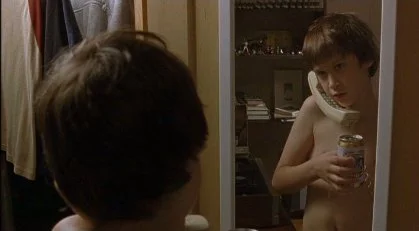#139: The Squid and the Whale
Release Date: October 7th, 2005
Format: Streaming (Netflix)
Written by: Noah Baumbach
Directed by: Noah Baumbach
4 Stars
The Squid and the Whale must resonate with many former children of divorce. I know it certainly did with me. Set in the mid-1980s, the story is about the separation of a family: the father, Bernard, a middle-aged writer and literature professor, his wife, Joan, also a writer, and their two sons, the teenage Walt, and his little brother, Frank.
Bernard is in denial about his own waning writing career, and rather than face the cold reality of his divorce, he begins dating one of his 20-year-old undergraduate students and sinks further into a mid-life crisis. His soon-to-be ex-wife Joan had been cheating on Bernard for months with their children’s tennis instructor, Ivan (played by William Baldwin, who hilariously steals every scene that he’s in). She admits she should have left the marriage a long time ago after realizing that separation and her romance with Ivan have imbued her with a new passion for life and her own writing career (which begins to flourish, of which Bernard is resentful). As for the children, teenage Walt idolizes his father, is angry at his mother for - in his mind - ruining their family, and begins arrogantly disregarding his girlfriend and his school work. And little Frank, poor little Frank, is totally lost. Unable to contextualize what is happening around him, he begins masterbating in the school library and drinking alcohol in his bedroom. It’s uncomfortably shocking and surprisingly amusing at the same time.
Writer/director Noah Baumbach captures this familial dissolution on handheld cameras using Super 16mm film, on location in New York City. It’s a brilliant move. Watching the movie, Baumbach’s camera immediately thrusts you into a lived-in NYC that goes beyond 1980s clothing and hairstyles and cars. As a person who has vague memories of the ‘80s, this is what I remember it looking like.
You can feel Baumbach’s heart through the photography. These locations that he films mean something to him. I’ve never been to New York City, but I don’t need to to know that. He’s shooting what he knows and loves.
And his script - nominated for Best Original Screenplay - and his performers are delightful, especially his two leads.
Jeff Daniels’ Bernard is one of cinema’s great all-time losers. He’s a conceited dickhead, and unintentionally hilarious. I’m sure Baumbach had fun writing these lines and skewering a certain type of narcissistic intellectual. When his teenage son Walt is in the midst of a total meltdown in the movie’s final act, Bernard’s idea of consolation is to loan him his first-edition copy of The Naked and the Dead. Here is a father that loves his son, but his only way of showing it is through the prism of his own identity and self-involvement.
Starring opposite Daniels is Laura Linney, one of my favorite actors. Her Joan is trapped, with no exit route that doesn’t hurt the very people she loves the most. Her sons are her world, but one hates her, and she must bravely face a new reality that Bernard refuses to. Does her ascendent writing career and romance with Ivan make her a bad person? Linney’s tone perfect performance conveys that Joan considers this all the time, and has no good answers for how this will all shake out.
Like I said, I’ve never been to New York City, and Noah Baumbach is a bit older than me, but I connected with The Squid and the Whale - which he calls a semi-autobiographical film - in a resonant way. There are deep tonal truths here in regards to how some children of divorce must navigate the treacherous emotional paths set by their parents, these two people they love the most, who now hate each other. Depending on the child, their inner worlds can easily become infected with feelings of loss, guilt, anger, and sadness.
The film ends with teenage Walt fleeing from his father and running to the Natural History Museum, where he and his mother used to spend time when he was a young boy, before his brother was born. There he visits an exhibit that depicts an enormous sperm whale battling a giant squid, miles below the ocean’s surface, in total blackness. It seems a fitting representation of a child’s psyche during divorce, and Baumbach’s film captures something elusive and true, even if he can’t quite put words to it. Much like a child can’t put words to it.
